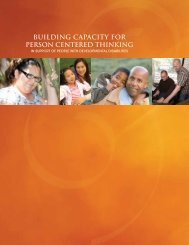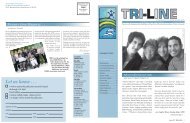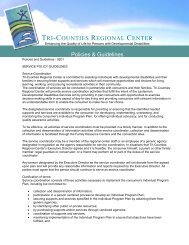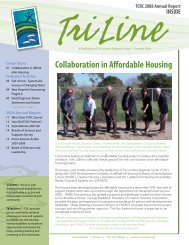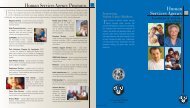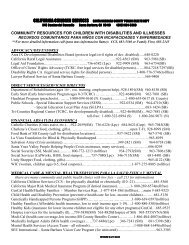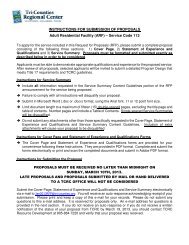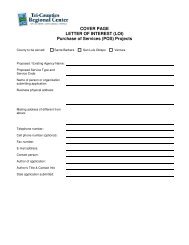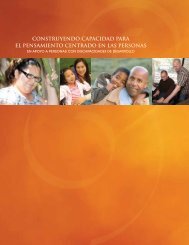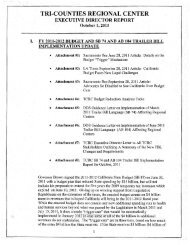TCRC Tri-Line Newsletter - Winter 2008 - Tri-Counties Regional ...
TCRC Tri-Line Newsletter - Winter 2008 - Tri-Counties Regional ...
TCRC Tri-Line Newsletter - Winter 2008 - Tri-Counties Regional ...
Create successful ePaper yourself
Turn your PDF publications into a flip-book with our unique Google optimized e-Paper software.
Advocating for My Child and Others<br />
by Linda Miyahira, M.S, Service Coordinator, Simi Valley team<br />
The word “advocacy” is thrown around more than ever these days. As<br />
parents of children with special needs, we are advised to become an<br />
advocate by every doctor and therapist we meet. So, what exactly<br />
does it mean?<br />
Advocacy, according to the dictionary, is the act of pleading or giving<br />
verbal support for a cause. To be an advocate means you must<br />
become that voice. This is easy enough if you have been trained to<br />
speak or have a natural gift for speaking up. For<br />
many parents, this is not the case, and it is a<br />
scary role that we are suddenly expected to<br />
step into immediately for our children.<br />
Generally, you are not alone in this process<br />
if your child is born with a condition that<br />
requires the assistance of doctors, therapists,<br />
and service coordinators. However, if your<br />
child has a condition that is not immediately<br />
obvious to anyone but family and friends,<br />
a parent’s world can feel like a dark chasm<br />
swirling with a myriad of possible diagnoses<br />
(thanks to the Internet) and professionals<br />
without names. For those of us involved with the regional center<br />
system and our local school districts, some of that confusion has been<br />
eliminated, but that does not end our advocacy. It is a lifelong role for<br />
many parents. So, where can a parent learn more?<br />
Rainbow Connection Family Resource Center is a wonderful support<br />
network that is run by parents of children in the <strong>Regional</strong> Center<br />
system. They have a lending library and a number of support group<br />
Think you are Getting Sick? How to Tell. . .<br />
By Louis Cassano, RN Nurse Specialist<br />
affiliates, provide regular trainings for parents and caregivers (which<br />
include the development of effective advocating with your regional<br />
center and school district), as well as a basic understanding of your<br />
child’s rights on both state and federal levels.<br />
It is necessary for parents to know when they are ready to advocate.<br />
Sometimes a parent must jump in and learn along the way when<br />
there is urgency. However, as a service coordinator and a parent, I<br />
have seen a number of parents with good intentions<br />
create huge rifts with the very people their<br />
children need in their lives. They burn bridges<br />
where there needs to be a smooth path for children<br />
to receive every necessary service to reach<br />
their potential.<br />
We all go through the grieving process (denial,<br />
anger, bargaining, depression, acceptance),<br />
and it is important to know where you are in<br />
that process before going about the business<br />
of advocating for your child or someone else’s<br />
child. It is also important to make sure that what<br />
is being advocated for is in the best interest of<br />
the child and not to satisfy a parent’s personal need (or subconscious<br />
vendetta). It requires much self-reflection and introspection, which<br />
is a brave act in itself. By doing this exercise, we can see more clearly<br />
and take a more objective approach.<br />
Advocacy is about building bridges and forming links that will give<br />
parents and their children appropriate support and access to every<br />
service that will help them both on their journey to a fulfilling life.<br />
health & safety<br />
If you have developed a few symptoms, but are unsure if<br />
you have a cold or allergies, the matrix below may help. It<br />
lists the symptoms of cold, flu, sinusitis and allergic rhinitis.<br />
symptoms COLD FLU SINUSITIS ALLERGIC RHINITIS<br />
FEVER<br />
Rare in adults and older<br />
children, may be high<br />
in infants and small<br />
children<br />
Usually high (102-104)<br />
and can last for 3-4 days,<br />
fever and chills<br />
HEAD ACHE Rare Sudden Onset, may be<br />
severe<br />
MUSCLE ACHES<br />
Possibly mild<br />
Yes, often severe<br />
TIREDNESS / WEAKNESS Mild Yes, may last two or<br />
more weeks<br />
EXHAUSTION Never Sudden onset, may be<br />
severe<br />
NASAL DISCHARGE Watery to thick, cloudy Sometime watery to<br />
or white<br />
cloudy or white<br />
Spotlight on the Web<br />
Not usual, fever may<br />
indicated infection<br />
Yes, may have facial or<br />
eye pain<br />
Not usual<br />
Mild<br />
Never<br />
Thick yellow-green sinus<br />
congestion<br />
Not usual, fever may<br />
indicate infection<br />
Possible<br />
Not usual<br />
Not usual<br />
Never<br />
Thin, watery, itchy eye<br />
SNEEZING Often Sometimes Sometimes Sometimes<br />
SORE THROAT Often Sometimes Not usual Often<br />
COUGH / CONGESTION Mild hacking, a lot of clear, Usual, may be severe. Especially at night Possible<br />
yellow or green phlegm A lot of clear, yellow or<br />
may indicate infection. If green phlegm may indicate<br />
infection. If wheez-<br />
wheezing, notify your doctor.<br />
If cough lasts 14 days ing, notify your doctor.<br />
or more, see your doctor.<br />
WINTER <strong>2008</strong> tri-line | 9



